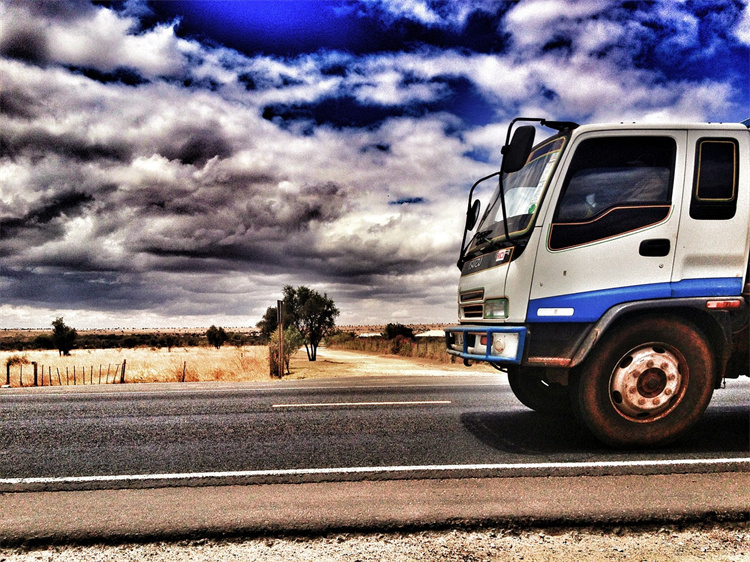Roadblocks and Solutions: Critical Issues in Cross-Border Freight Transport by Truck

Cross-border trucking plays a vital role in global trade. It enables the efficient transportation of goods between countries. This industry has shown remarkable growth, with over $82 billion in goods moved in November alone. The trucking sector experienced a near 5% year-over-year increase, continuing a 33-month growth streak since February 2021. Understanding the challenges in border trucking is crucial for maintaining this momentum. Addressing these issues helps meet the demands of trading partners and contributes to economic growth.
Regulatory and Compliance Challenges in Border Trucking

Customs Procedures in Border Trucking
Documentation Requirements
Customs procedures require accurate documentation. Trucking companies must prepare documents such as commercial invoices, packing lists, and bills of lading. Incorrect or incomplete paperwork can lead to delays. Customs officials need these documents to verify the contents of shipments. Proper documentation ensures smooth border crossings.
Customs Clearance Delays
Customs clearance delays pose significant challenges. Delays often occur due to high traffic at border crossings. Peak hours and busy periods exacerbate this issue. Inadequate staffing at customs facilities can also contribute to delays. Efficient processing at ports of entry is essential for timely deliveries.
Trade Regulations
Tariffs and Duties
Trade regulations include tariffs and duties on goods. Governments impose these charges to regulate trade and generate revenue. Trucking companies must calculate these costs accurately. Failure to comply with tariff regulations can result in fines. Understanding the applicable tariffs is crucial for cost management.
Compliance with International Trade Laws
International trade laws govern cross-border trucking. Companies must adhere to regulations set by different countries. Non-compliance can lead to penalties and shipment confiscation. Staying updated with changing trade policies is vital. Compliance ensures legal and smooth operations.
Border Security Measures
Security Checks and Inspections
Border security measures include thorough checks and inspections. Customs officials inspect trucks to prevent illegal activities. Security checks ensure the safety of transported goods. These inspections can cause delays but are necessary for security. Trucking companies must cooperate with security protocols.
Impact on Delivery Times
Security measures impact delivery times. Extended inspections can delay shipments. Companies must account for potential delays in their schedules. Efficient planning can mitigate the impact on delivery times. Understanding security requirements helps in better time management.
Logistical Challenges

Infrastructure Issues
Road Conditions
Road conditions significantly impact border trucking. Poorly maintained roads can lead to vehicle damage and increased maintenance costs. Potholes, uneven surfaces, and lack of proper signage create hazards for drivers. These conditions slow down transportation and increase the risk of accidents. Investing in road infrastructure improves safety and efficiency in cross-border trucking.
Border Facilities
Border facilities play a crucial role in the logistics of border trucking. Inadequate facilities can cause delays and congestion. Efficient border facilities should include ample parking, inspection areas, and restrooms for drivers. Proper infrastructure ensures smooth operations and reduces waiting times. Governments and private sectors must collaborate to improve these facilities.
Coordination and Communication
Language Barriers
Language barriers pose significant challenges in border trucking. Drivers often face difficulties communicating with customs officials and local authorities. Misunderstandings can lead to delays and errors in documentation. Providing language training for drivers and employing multilingual staff at border crossings can mitigate these issues. Effective communication ensures compliance and smooth operations.
Coordination Between Multiple Parties
Coordination between multiple parties is essential in border trucking. Trucking companies, customs officials, and local authorities must work together seamlessly. Lack of coordination can result in missed deadlines and increased costs. Implementing standardized procedures and using technology for real-time updates can enhance coordination. Clear communication channels ensure efficient border crossings.
Technological Integration
Tracking and Monitoring Systems
Tracking and monitoring systems are vital for border trucking. These systems provide real-time information on the location and status of shipments. GPS and telematics help in route optimization and timely deliveries. Tracking systems also enhance security by preventing theft and unauthorized access. Investing in advanced tracking technology improves overall efficiency.
Data Sharing and Interoperability
Data sharing and interoperability are crucial for efficient border trucking. Different stakeholders need access to accurate and timely information. Interoperable systems allow seamless data exchange between trucking companies, customs, and other authorities. This integration reduces paperwork and minimizes errors. Standardizing data formats and protocols ensures smooth operations and compliance.
Financial Challenges
Cost Management
Fuel Costs
Fuel costs represent a significant expense in cross-border trucking. The price of fuel fluctuates frequently, impacting the overall cost of transportation. Trucking companies must monitor fuel prices closely to manage expenses effectively. Lower fuel consumption rates for railways compared to motor vehicles highlight the need for efficient fuel management in trucking. Optimizing routes and maintaining vehicles can help reduce fuel consumption. Investing in fuel-efficient technologies also contributes to cost savings.
Maintenance and Repair Costs
Maintenance and repair costs are another major financial challenge. Cross-border drivers face unique vehicle maintenance requirements due to varying road conditions. Poorly maintained roads can lead to frequent repairs and increased maintenance expenses. Regular vehicle inspections and preventive maintenance can mitigate these costs. Keeping vehicles in good condition ensures safety and reduces the likelihood of breakdowns. Proper maintenance also extends the lifespan of trucks, providing long-term financial benefits.
Currency Fluctuations
Impact on Pricing
Currency fluctuations affect the pricing of cross-border trucking services. Exchange rates between countries can change rapidly, impacting the cost of goods and services. Trucking companies must account for these fluctuations when setting prices. Accurate pricing ensures competitiveness and profitability. Understanding the weight-to-value ratio of commodities traded helps in managing the impact of currency changes. Companies must stay informed about economic conditions to anticipate and respond to currency shifts.
Financial Planning and Risk Management
Effective financial planning and risk management are crucial in cross-border trucking. Companies must develop strategies to mitigate the risks associated with currency fluctuations. Hedging and other financial instruments can protect against adverse currency movements. Budgeting for potential cost increases due to exchange rate changes ensures financial stability. Trucking companies should also diversify their markets to spread risk. Comprehensive financial planning supports sustainable operations and growth in the cross-border trucking industry.
Strategic Solutions and Best Practices
Strategic Planning
Route Optimization
Route optimization plays a crucial role in cross-border trucking. Efficient route planning reduces fuel consumption and travel time. Trucking companies use advanced software to determine the best routes. These tools consider factors such as traffic conditions, road quality, and border crossing times. Optimized routes minimize delays and enhance delivery efficiency.
Risk Management Strategies
Risk management strategies are essential for successful cross-border trucking. Companies must identify potential risks such as customs delays, security threats, and currency fluctuations. Developing contingency plans helps mitigate these risks. Regular training for drivers and staff ensures preparedness for unexpected situations. Effective risk management enhances reliability and customer satisfaction.
Technology Integration
Use of GPS and Telematics
GPS and telematics technology revolutionize cross-border trucking. GPS systems provide real-time location tracking of trucks. Telematics offer insights into vehicle performance and driver behavior. These technologies improve route planning and fuel efficiency. Trucking companies can monitor shipments and ensure timely deliveries. Investing in GPS and telematics enhances operational efficiency.
Automation in Documentation
Automation in documentation streamlines border trucking processes. Automated systems handle tasks such as generating invoices, tracking shipments, and managing customs paperwork. This reduces human error and speeds up processing times. Automation ensures compliance with regulatory requirements. Efficient documentation processes lead to smoother border crossings and reduced delays.
Partnerships and Collaborations
Working with Local Partners
Working with local partners strengthens cross-border trucking operations. Local partners provide valuable insights into regional regulations and market conditions. Collaborating with local businesses enhances logistical support and resource sharing. Trucking companies benefit from established networks and expertise. Strong partnerships improve efficiency and reduce operational challenges.
Building Strong Relationships with Customs Authorities
Building strong relationships with customs authorities is vital for smooth border crossings. Positive relationships facilitate faster customs clearance and reduced inspection times. Regular communication with customs officials ensures compliance with regulations. Trucking companies should engage in cooperative initiatives and participate in industry forums. Strong relationships with customs authorities enhance operational efficiency and reliability.
Cross-border trucking faces several key challenges. These include regulatory compliance, logistical hurdles, and financial constraints. Addressing these challenges is essential for successful operations. Efficient cross-border trucking supports global trade and economic growth.
Future trends in cross-border logistics will focus on technological advancements and strategic partnerships. Innovations like GPS tracking and automation will streamline processes. Collaborations with local partners and customs authorities will enhance efficiency.
Businesses must adopt best practices and innovative solutions. Implementing route optimization and risk management strategies will improve performance. Embracing technology and building strong relationships will ensure smooth cross-border operations.
See Also
Discovering Triumph in International Trade with JUSDA
Revolutionary Approaches: Partner Connections in Global E-commerce Revealed
Top Security Measures for Intelligent Transportation Systems
Guiding Through Hurdles in the Auto Parts Distribution: Pro Advice
